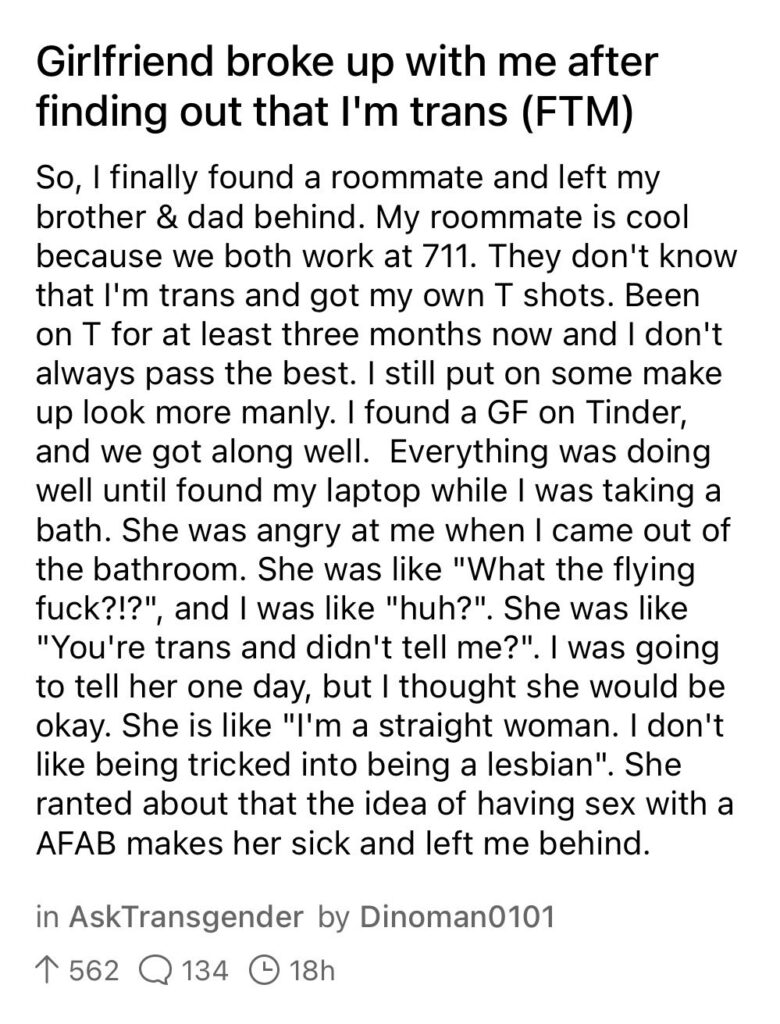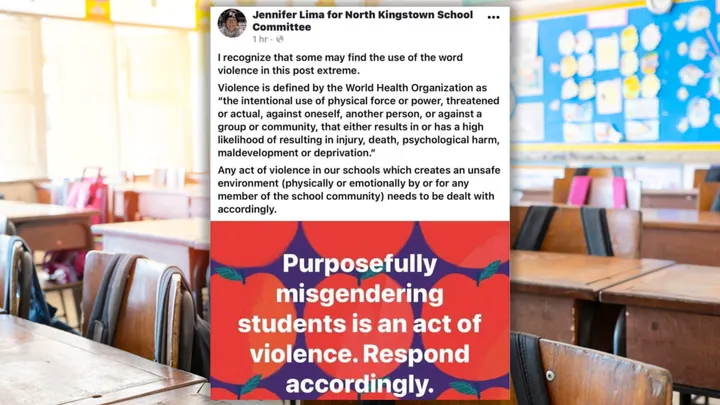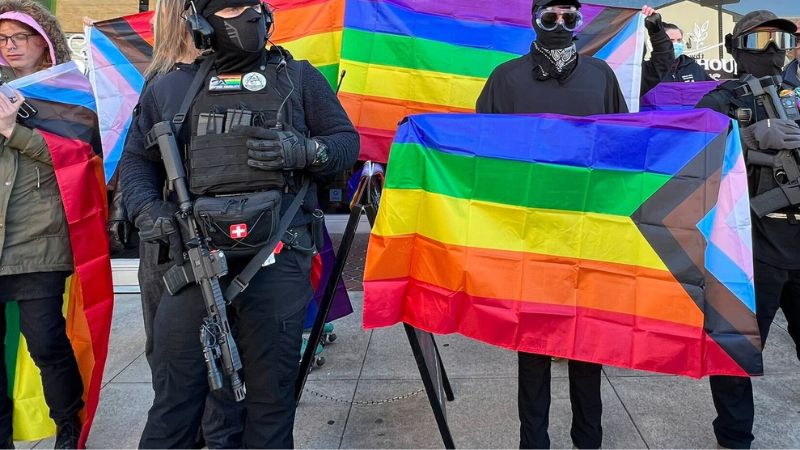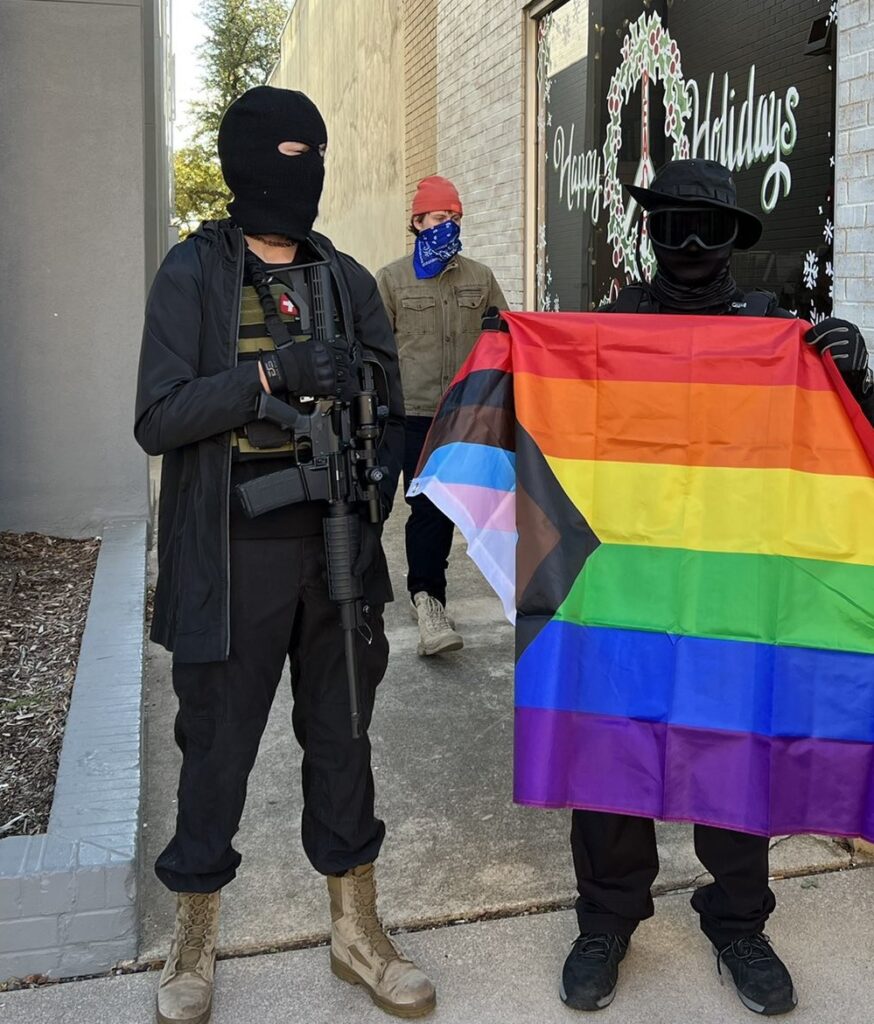
Tranny Insanity
Mental Illness
The tranny that was hired by the Biden administration to run the country’s nuclear waste disposal has been charged with stealing luggage at the airport. You have to read the story to believe it.
Who knew that people with mental illness would act crazy?
Tranny Insanity
Not the Right, After All
The shooting at the fag club in Colorado was blamed upon the right. Come to find out, it wasn’t anyone on the right after all. It was a tranny, proving again that the trannies are, by definition, delusional.
Tranny Insanity
OK, I will play your silly game.
The ACLU claims that college students in California have a legal and constitutional right to be called the names and pronouns of their chosen gender identity. They claim that this right exists even if you have not legally changed your name. It isn’t just the ACLU in California- the organization’s national policy mirrors it. Interesting that they invent this “right” out of thin air while simultaneously ignoring the Second Amendment and SCOTUS on that issue.
In June 2020, the Supreme Court of the United States in Bostock v. Clayton County concluded that discrimination on the basis of sex encompasses both discrimination based on sexual orientation and discrimination based on gender identity.
In 2016, one college student made a game out of it and declared to his school that his pronoun was “His Majesty” and used official school policy to force staff members to use it. The left went apoplectic, claiming that he fundamentally doesn’t understand gender identity—or pronouns. I think that it is the left that doesn’t get it.
Total Frat Move wrote that gender-neutral pronouns just make “everyday a fun game of ‘let’s solve the puzzle in my pants,’” and that “when you inconvenience the entire world because you learned a hip new word you insist on being called, then you’re just an asshole.”
I agree, but in the spirit of this, we must acknowledge that the law requires that I be called whatever name or pronoun corresponds to my gender identity. If I ever find myself in an environment that insists I follow such a silly and arbitrary rule, I will find in necessary to prove just how silly and arbitrary it is. So let’s refer to the US Department of Labor to see how we can do this. Here are the definitions that they are using:
Names and Pronouns. Refer to each person by the name and the pronoun(s) by which the person wants to be referred. If you don’t know, ask in a tactful and respectful way. For example, you can say, “what pronouns do you use?” or you can introduce yourself with the pronouns you use, which may prompt someone to share the pronouns they use. Continued intentional misuse of a person’s name and pronouns – also known as misgendering – may breach the person’s privacy, may put them at risk of harm, and in some circumstances, may be considered harassment.
Gender identity: A person’s internal sense of being male, female, or something else such as agender, binary, gender fluid, gender nonconforming, genderqueer, or nonbinary. Since gender identity is internal, one’s gender identity is not necessarily visible to others. All people have a gender identity.
So let’s choose something to illustrate the absurdity of this, and then use the law to bludgeon them over the head with it. I choose to identify as Schrodegender. That is, I simultaneously exist in a quantum state of all genders, and only resolve into one specific gender once the observer makes an attempt to measure my specific gender. Each person will be required to look in my pants to observe whatever genitalia I am expressing at that moment before using that pronoun.
Or you can just call me “Assmaster,” either will be acceptable. To refuse to do so is to violate my constitutional rights.
Tranny Insanity
They Want to Kill You
A Rhode Island School district is now claiming that using the wrong pronoun for a tranny is violence and people should “respond accordingly.” It seems to me that they are saying that the use of force should be authorized to stop someone from using the wrong pronouns.

“I absolutely believe in First Amendment speech protections, both as an elected official and an individual,” Lima added, “I do not believe that post suggests that using incorrect pronouns should be met with violence.”
The left claims that riots are “mostly peaceful,” that the J6 protest was an insurrection, and Kyle Rittenhouse deserved to be attacked because he shouldn’t have been there in the first place. Now they claim that a call to use the force of government to “investigate and discipline such occurrences in the same way as any other biased-based assault” is not violence.
War is Peace, Freedom is Slavery, Ignorance is Strength.
Fine. Bring it on. Let’s get this party started.
Antifa
Antifa Photo Intel
Just in case you were wondering what Antifa is up to- here is a picture of them in Denton, TX, where the Antifa insurgents were providing armed protection for a drag show performance aimed at children. Note that the police and Antifa were working together at this event. At this point, residents of Denton, TX can assume that local LE are allied with Antifa. For this reason, Denton (a suburb on the NW side of Dallas) is now added to Zone 2.

The guy on the right is carrying an AR made from an 80 percent lower. His kit is rather sparse. No TQ, no FA kit, nothing but weapon, some ammo, and a radio. In fact, both of them look light on ammo. Less than 100 rounds tells me that they are there more for photo ops on social media and intimidation than they are for fighting, but then again, no one has really offered any fight, so I guess that doesn’t matter. I would also take careful notice that the guy on the right is wearing a body camera. So is the one behind him (mostly hidden by the Fag Flag) you can see the camera between the rainbow flag and the red one.
Looks like both have plates, but they don’t have helmets or pelvic coverage. I bet 62 grains moving at a couple of thousand feet per second through their pelvis would make them combat ineffective.
The idiot dressed like a cat is in the way of me getting a good look at the guy on the left, so we need to take a look at a different photo to see his kit a bit better.

Taking a look at his AR, it looks like an 80 percent lower as well. That bag marked as a FA kit doesn’t look large enough to be serious.
The third guy I want to take a look at may or may not be a skinny chick (on the left).

A couple of interesting things here. The boots are well worn. The only ammo carried is the mag that is loaded into the mag well of the (again) 80 percent AR. One odd thing is that the gas block has a plastic thread on it that looks like it secured the price tag to it at one point.
Another interesting thing about the ARs- they are all 80 percent lowers, but the similarity in parts ends there. That would seem to indicate that each of them made their own weapon. The thing is, every one of the ARs in these photos look like they are brand new. Not single flaw in the bluing. No wear, no scratches. Not anywhere. It’s like they have never been fired or even handled all that often. I am wondering if they have even been zeroed.
Anyway, if you see anything interesting in these photos, let me know in comments.
Tranny Insanity
Canceled
JK Rowling is a liberal. She was once the crown jewel of the left: a feminist, pro gay woman whose wealth in the UK was only surpassed by the Queen herself. Her books were printed into more copies than any other books, except the Bible itself.
When the movie, merchandising, and theme park money came rolling in, the numbers were incredible. Universal Studios in Orlando was selling plastic sticks labeled as ‘Harry Potter’ wands at a rate of $10k a day, more than $100 each.
Then Rowling spoke out against the trannies. That began the backlash. Even the child stars whose careers are entirely owed to Rowling and her books denounced her. Now it’s official: she has been canceled, and so has the entire franchise.
I know you are thinking, “So what?” Here is why that’s important: Warner Brothers just turned their backs on a multi-billion dollar movie franchise in order to appease a demographic that is comprised of less than 2% of the population. Let that sink in.
Grooming Children
Mom Arrested For Letting Son Get Tattoo
If she had let him get an operation to cut off his dick, she would have been fine, but letting a 10 year old get a tattoo is just going too far.
Tranny Insanity
We Always Knew They Were Going Here
Virginia Democrats introduce legislation that would criminally prosecute parents who don’t affirm their child’s “gender identity.” The bill expands the state’s definition of child abuse and neglect to include parents who do not affirm their child’s gender identity or sexual orientation.
This would require people mandated by virtue of their jobs to report the parents to authorities if a child tells them that the parent doesn’t support or affirm the child’s decision to be a tranny. So nurses, teachers, paramedics, and police would be required to report you for refusing to buy your son a dress when he tells you that he wants to be a girl now.
Depending on how the law gets written, it could be a felony to not use a child’s chosen pronouns, and it may not be just parents who are susceptible to the new law. Some bearded 17 year old fruitcake in a dress demands that you use ‘zir’ or ‘zem’ could report you and have you arrested for child abuse when you laugh at his crazy ass.
You could be the next person getting pepper sprayed and being chucked in jail.
To those who claim this violates your religious freedom, Democrats have this to say:
“The Bible says to accept everyone for who they are. So that’s what I tell them when they asked me that question, and that’s what I will continue to tell people. You know, we all have a commitment to God And for those believers out there, we know that there’s life after life, and there is going to be a conversation between that person and God and that’s what we’re after — to go by what the Bible says. It is not my job to judge anyone. It is my job to help people.”
Now Democrat government officials, who constantly bleat about separating church and state, feel qualified to interpret the Bible for you and tell you what you are supposed to believe.
Tranny Insanity
Welcome to the DOJ
Apparently, the liberal members of the medical profession want the DOJ to to “investigate and prosecute” Americans who question child sex-change surgeries and transgender treatments online.
It’s called the First Amendment, assholes. They also called on Big Tech to censor and deplatform individuals who question their faggotry and abuse of children.
So to all of you at the American Medical Association, American Academy of Pediatrics, and Children’s Hospital Association- go fuck yourself. I have a server in a foreign country. I won’t be silenced, and I won’t be deplatformed. I also won’t back down in calling your mutilation of children what it is- an abomination.
You can write a million papers and have them reviewed by a million of your peers, and I will still tell you what few others will- your tranny emperor is not supposed to groom kids into being your little fuck toys in whatever evil games you are playing.
To you in the DOJ- begin your investigation here:
Congress shall make no law respecting an establishment of religion, or prohibiting the free exercise thereof; or abridging the freedom of speech, or of the press; or the right of the people peaceably to assemble, and to petition the Government for a redress of grievances.
Let me know if you have decided that that document no longer applies.